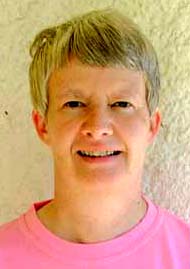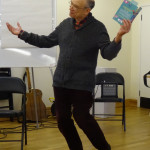Hello, Jill. And welcome to The Poetry Zone. When did you first become interested in poetry?
It was at school when I was about eight. The teacher we had that year asked us to learn some poems and the one I remember best was ‘Cargoes’ by John Masefield which was full of exciting new words about exotic ships and their cargoes (it also includes a less glamorous British coaster). I just loved the sounds in that. She also read us ‘The Song of Hiawatha’ by Henry W. Longfellow which has this wonderful driving rhythm and a great story.
At about the same time we were asked to write a poem for the first time. I think mine was about a swan and as soon as I tried to write it I felt this was something special to me, though also a bit mysterious and mystical.
Poetry’s always been important to you then?
Yes, although I didn’t think of writing professionally – it was just something I did.
Did you enjoy school?
Yes and no. I was quite lonely especially when I was young because I was off sick a lot. Later on it was better, when I wrote plays and put them on at school.
So you write things other than poetry?
Yes, I’ve written a few plays and two of them have been given a professional read-through at our local theatre. Sadly, they are about to knock the theatre down – I don’t know if the two things are related!
I’ve also written a couple of opera libretti but I need a composer to work with now. I love opera – it’s very powerful when it really works and even if some of the stories are a bit daft the ideas underneath are dealing with the sort of things we all feel and think about – being jealous or scared, falling in love and so on.
Do you write for adults?
Yes, that’s how I started out once I’d left school – writing poetry and plays for grown ups. Then I thought it would be interesting to write for children as well, so I had a go.
How long does it take to write a poem?
That varies tremendously – sometimes a few minutes, sometimes years, but I suppose most poems take something in between. Poems that look very simple don’t always come quickly because the words have to be exactly right for the age group they are meant for. Sometimes you can hitch a ride by using a well known story as in this poem:
Red Ridinghood
“Don’t eat Granny, Mr. Wolf.”
“Too late, Miss Ridinghood,
I’ve eaten her. But I’ve still got room
for a plump little girl for pud.”
At other times you can just have fun playing around with words and letting your imagination go free.
I think this next one is one of my favourites of all the poems I’ve written. I wrote it when I was asked for ideas about well known sayings.
Time and Tide
Time and tide wait for no man,
‘specially if you’re a snowman
on a beach, looking out to sea,
for though the sun is watery,
as time goes on it’ll melt your heart:
bit by bit you’ll fall apart,
snow and man part company –
man goes paddling in the sea
and all that’s left eventually
is snow now no
O
It’s a bit sad I suppose but I liked the way all the ideas just came together, especially at the end. Another example of wordplay might be this one:
Knightly Greetings
Ladies who lived in castles
had to be very polite.
“Good evening,” their Lords would say.
“Good night,” they’d say, “Good Knight.”
Are you writing anything at the moment?
I’ve been writing some grown up poems about bridges recently. Bridges can suggest all sorts of ideas: do you go forward or back from the middle? What’s underneath the bridge?
Who are your favourite poets?
I think Ted Hughes is the one who made the biggest impression on me, but I also like a huge range from A.A.Milne and Eleanor Farjeon to John Keats and T.S.Eliot. Among living writers – John Burnside, David Constantine, David Harsent, Ruth Fainlight, Alice Oswald; and I always look out for anything by Liz Brownlee, Rachel Rooney and Celia Warren!
Do you visit schools?
No, that’s something I haven’t done yet; not that I’m not interested in what children think but I was very shy when I was young and I suppose I still am. Standing up in front of thirty or so strangers is really scary, but I’m working on it.
What football team do you support?
Oh, Liverpool. No contest. My all time favourite players were Steve Heighway, Michael Owen and Kenny Dalglish but the current team are very good.
I have to say that you’re right. Liverpool are brilliant. Have you any pets?
Yes, I have a Scottie dog called Robbie who is quite old now. He often lies under my desk when I’m working – like now.
How do you spend your spare time?
Walking with Robbie, going to the theatre or opera when I can, swimming, and reading of course.
Do you have a web page?
Yes. It’s due for an update. But do visit. It’s www.jilltownsend.me.uk
Are there any things that you’d like to do that you haven’t done yet?
I would like to do something with some story-poems I’ve started which are made-up myths I suppose, about things like volcanoes, plate tectonics and earthquakes. I’ve been interested in those sorts of things since I was young.
And finally, what advice would you give to young poets?
Read a lot, of course – find out what you like, or even dislike, about other people’s work – and be true to what you feel: don’t think you have to please or copy someone else. Also learning poems or bits of poems by heart can teach you an awful lot in a way that just reading them doesn’t.
Thank you for asking me into the Poetry Zone, Roger.
It’s been a pleasure.





